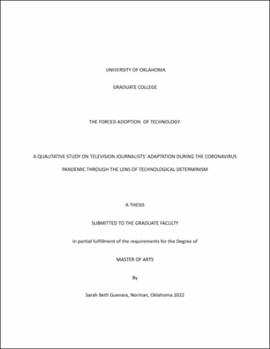| dc.contributor.advisor | Jones, Julie | |
| dc.contributor.author | Guevara, Sarah | |
| dc.date.accessioned | 2022-05-27T18:43:27Z | |
| dc.date.available | 2022-05-27T18:43:27Z | |
| dc.date.issued | 2022-05-13 | |
| dc.identifier.uri | https://hdl.handle.net/11244/335842 | |
| dc.description.abstract | This study focuses on local news leaders and journalists who faced unique circumstances in 2020 due to lockdowns and various restrictions because of Covid-19. This historic period provided a unique opportunity to see how journalists react to the forced adoption of technology when nearly every newsroom was forced to adopt different methods to continue newsgathering. Findings showed managers and journalists alike want to create connections between coworkers, but found it awkward to connect through a new workplace culture based on transactional relationships where very few opportunities have arisen for emotional bonds. Technology acted as a bridge connecting coworkers to their job and each other. As the pandemic evolved, technology became more of a barrier preventing strong emotional connections.
Keywords: COVID-19, Journalism, managment | en_US |
| dc.language | en_US | en_US |
| dc.rights | Attribution-NoDerivatives 4.0 International | * |
| dc.rights.uri | https://creativecommons.org/licenses/by-nd/4.0/ | * |
| dc.subject | COVID-19 | en_US |
| dc.subject | newsroom management | en_US |
| dc.subject | Journalism | en_US |
| dc.title | The forced adoption of technology: a qualitative study on television journalists’ adaptation during the Coronavirus pandemic through the lens of technological determinism | en_US |
| dc.contributor.committeeMember | Schmeltzer, John | |
| dc.contributor.committeeMember | Wilderman, Melanie | |
| dc.date.manuscript | 2022-04-22 | |
| dc.thesis.degree | Master of Arts | en_US |
| ou.group | Gaylord College of Journalism and Mass Communication | en_US |

